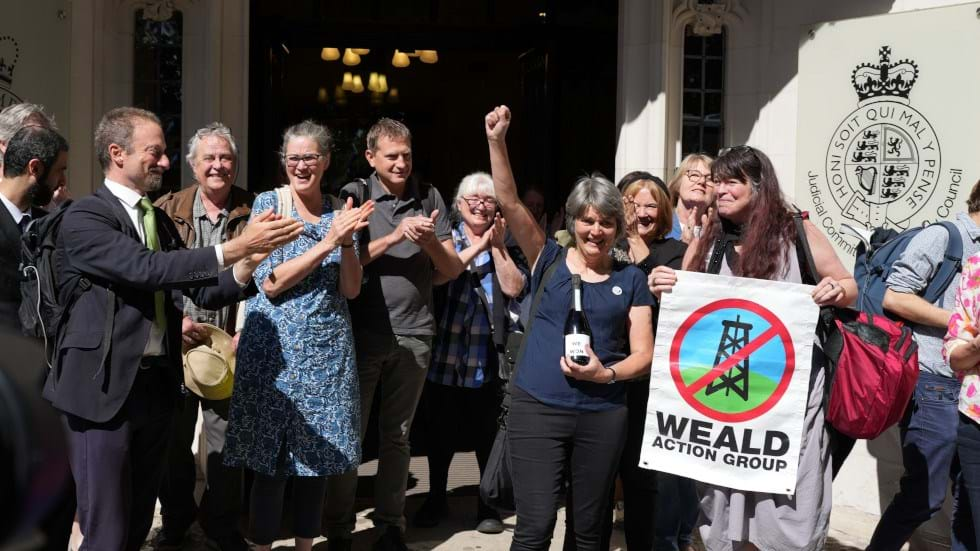Landmark ruling could put UK fossil fuel projects at risk

THE impact of burning fossil fuels should be taken into account when approving energy developments, the UK’s Supreme Court has ruled in a verdict that may put future oil, gas, and coal projects at risk.
The ruling centered on a case brought against Surrey County Council by local resident Sarah Finch. In 2019, the council granted permission for Horse Hill Development to expand oil production at its onshore drilling site. Finch argued that the Council should have required Horse Hill to assess not only the environmental impacts of direct emissions from activities at the drill site (scope 1 and 2 emissions) but also the impacts of the downstream greenhouse gas emissions (scope 3) that will result from the eventual use of the refined products produced from the oil extracted there.
The High Court and Court of Appeal disagreed with Finch but yesterday Supreme Court judges ruled 3-2 in her favour. Writing in judgment, they said: “The purpose of the Environmental Impact Assessment is to ensure that, whatever the decision taken, it is taken with full knowledge and public awareness of the likely significant environmental consequences. Consequently, the council’s failure to assess the effect on climate of the combustion of the oil that would be produced from the proposed well site means that its decision to grant planning permission for the project was unlawful.”
They added: “The legislation does not prevent the planning authority from giving consent for a project that is likely to cause significant harm to the environment; but it requires the authority to reach a reasoned conclusion on the environmental impact and to take this conclusion into account in making its decision.”
Finch brought the case on behalf of Weald Action Group, a coalition of campaigners opposing oil and gas projects across the region. The group said the landmark ruling would make it harder for new fossil fuel projects to go ahead. In a statement reacting to the news, they said fossil fuel companies “can no longer pretend that downstream emissions are someone else’s problems”.
Greenpeace, which supported Finch in her case, says in light of the ruling it expects authorities to concede in its legal fight against the development of Equinor’s Rosebank and Shell’s Jackdaw oil and gas fields in the North Sea. The ruling could also impact the development of the proposed Whitehaven coal mine in Cumbria, which in 2022 became the first coal mine approved in the country in more than 30 years.
The government has faced sustained criticism for continuing to support oil and gas projects given its legally binding carbon target to be net zero by 2050 and warning from the IEA that no new developments should be allowed if we are to limit global warming to 1.5oC.
Stephen Sanderson, CEO of UK Oil & Gas, the firm behind the Horse Hill project, said he was perplexed by the Supreme Court’s ruling. In a statement, the company said the interpretation at the time it sought approval for the project was that any emissions resulting from the crude oil it produced would be subject to other end-use emissions controls used at refineries or in vehicle use, “which lie beyond the developer's control”. The company said it will now work closely with the council to rectify the problem and either amend the original application or submit a new one.
Sanderson said the ruling “further underscores why the company's focus over the past few years has shifted away from oil and gas and firmly towards creating and delivering strategic underground hydrogen storage, an essential element of the UK's future low carbon energy system”.
“These projects have the potential to create far greater sustainable value for the company and the UK than any small onshore field such as Horse Hill. They also have the added benefit of making a positive contribution to net zero.”
A spokesperson for Surrey County Council said: “Council officers at the time of the planning application assessment believed that they acted in compliance with the law. The judgement makes it clear that local planning authorities must have regard to downstream emissions.”
Misplaced concern for other sectors
A judge in an earlier case had raised concerns about the implications that might occur for other sectors if downstream emissions had to be considered by producers. For example, could the developer of steel plant be required to account for the emissions that would result from a plane or car being built from the steel they produce?
The Supreme Court judges said these concerns are misplaced and ruled that: “Raw materials such as steel can be put to many possible uses, and the view might reasonably be taken that no meaningful assessment or estimate can be made of what emissions will ultimately result from its use. Oil is a very different commodity. There is no element of conjecture about what will ultimately happen to the oil; refining the oil does not change it into a different type of object (unlike the incorporation of a part in a motor vehicle or aircraft); and a reasonable estimate can readily be made of the emissions that will occur upon its inevitable combustion.”
Recent Editions
Catch up on the latest news, views and jobs from The Chemical Engineer. Below are the four latest issues. View a wider selection of the archive from within the Magazine section of this site.




